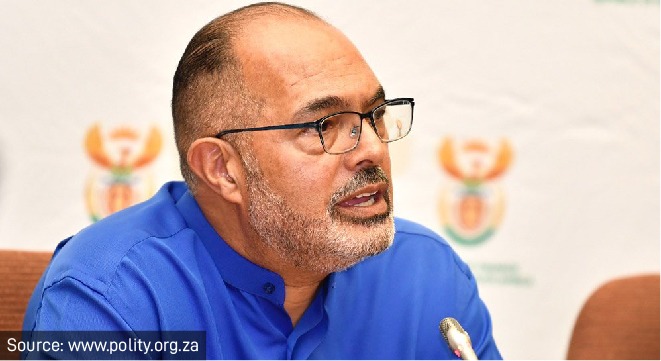The Commissioner of the South African Revenue Service, Edward Kieswetter (pictured), has told Members of Parliament how SARS “thinks about taxing the wealthy”.
Kieswetter was responding to questions from MPs during a joint meeting of Parliament’s Standing Committee on Appropriations, Select Committee on Finance, Standing Committee on Finance, and Select Committee on Appropriations on 14 March.
He said the first question that must be answered is how to define “the wealthy”. “There isn’t a common definition.” Once there is common definition, SARS must identify and find those to whom a wealth tax would apply.
Then SARS must build the capacity to administer the wealth tax, “because if we don’t, inadvertently you will have a worse outcome if you can’t administer the policies or the measures that we take”. This requires “a deep amount of work”, “and it certainly will not bring instant money if we were to do so”.
Kieswetter pointed out that South Africa is “not without a wealth tax”.
Currently, about 48% (R390 billion) of the R800bn in revenue from personal taxes is derived from people who earn more than R1 million, “so we would say maybe they begin to speak to the wealthy”, he said.
“Almost half of our taxes come from only 570 000 individuals, and so that’s already a tax on wealthy people.” This represents 7.2% of individuals who are taxed, but only 3.9% of individuals who are employed.
South Africa has other forms of wealth taxes, including estate duty, “which is biased towards collecting money from the wealthy”, donations tax, securities transfer tax, transfer duty, capital gains tax, and the property rates levied by local governments. All these, he said, are “forms of wealth tax, and so we’re not starting off a blank page when we talk about a wealth tax”.
Kieswetter said SARS took an “initial stab” at defining “the wealthy” in 2021 when it created the High Wealth Individual Unit (HWIU), which started collecting the data of all individuals who, on registers, own more than R50m in assets.
An analysis of the data found that about 2 800 individuals have more than R50m in assets, and among these individuals, R460bn of assets are registered as local assets and about another R150bn are offshore assets. SARS knows this because of the automatic exchange of information from more than 100 countries. The tax on these individuals’ income is about R7bn.
The HWIU is “highly under-capacitated”. The Unit has a staff about 80, whereas it should probably have about 500 people, Kieswetter added.





We currently have an large undisclosed figure of foreign migrant workers most of whom are not registered for uif, workman’s compensation etc due to their overstay expired visa, of these migrants a number of them are conducting small construction companies off the radar. The 8moact on legitimate business is huge as such off the radar workers and operations are taking business from registered tax paying companies. My point is there is a large basket of imegrants operating off the radar and taking food off the table of registered companies.
Let’s register all foreigners let them stay and pay
Spaza shops don’t pay VAT
So it then appears that the Minister of Money is not aware of the facts! In fact government do not appear to know what and which legislation they have passed. Problem is that the money pot has run dry, and one can longer scrape the bottom. There is no bottom left. This ANC has really put us South Africans in a tight spot. Let’s theorize and think about our next move.
The focus should not be on who can they collect more from. Rather insure compliance on collections, minimize wastage , halt corruption and increase efficiency of tax money uterlization.
We love our country , I would have no issues paying more if I could see a productive end result of my hard earned money. Look at the Nordic countries, very high tax but also very high returns on that money . Those citizens rate amongst the happiest in the work in spit of high tax.